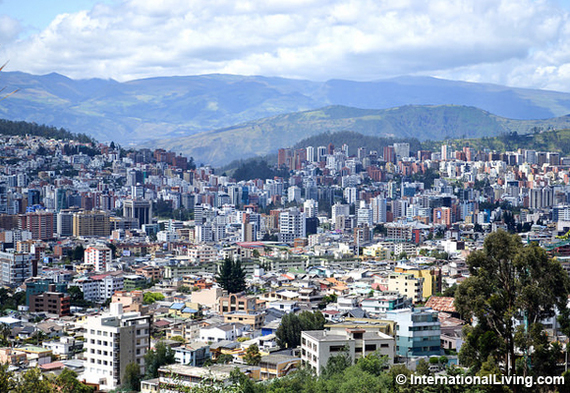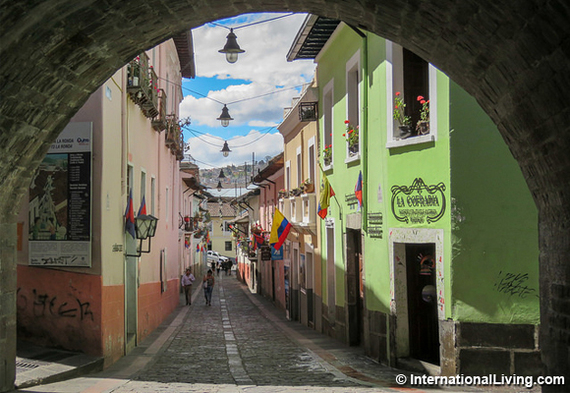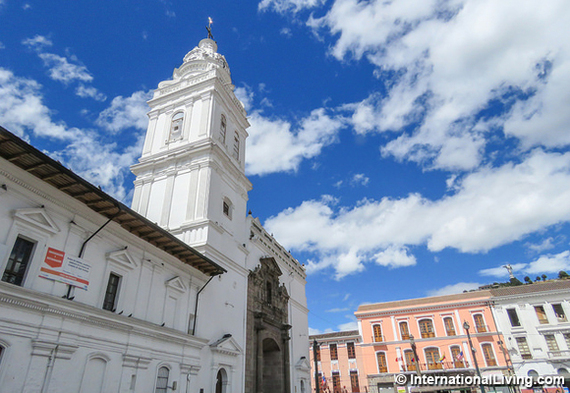By Wendy Dechambeau, InternationalLiving.com
"Within four blocks of where we live on a quiet, hillside neighborhood of condo-lined streets, there are at least a dozen of the best restaurants in the city," says expat Wayne Bustle, 73.
Landscape of Quito, Ecuador
"There's Asian right down the street, there's seafood, there's a great pasta restaurant, a hamburger place up on the hill, sushi places ... the restaurants are so varied that it is hard to describe them all. This past month we found a new one in the Mariscal district we didn't know was there. It was like a gentlemen's club in England--the food was outstanding."
This abundance of restaurants is par for the course when you live in Quito, Ecuador's capital city, which Wayne and his wife Mary Riley, 69, have chosen as their retirement home. The city has the largest colonial quarter in Latin America.
"The museums, especially the art museums, change their exhibits monthly or bimonthly, so we have no problem having at least one cultural event per week," says Wayne. "And it is so inexpensive to travel, we make trips to other cities in Ecuador to see other cultural events."
"We've been twice to the exhibition center, and just this past weekend they had a big thing on chocolate commerce," says Mary. "We ate our way through that," says Wayne.
La Ronda in Old Town in Quito, Ecuador
"We've also made the commitment now to go to a different museum every week," says Mary. "I also go to the library once a week and volunteer. The person we rent from has an Ecuadorian literary guild. He's trying to introduce expats to Ecuadorian literature, and once every six weeks or so he'll have an event. It's a book club, so we all read the book and then talk about it, and then he brings the author in so we can talk to them."
With temperatures from the 50s F to the 70s F year-round, enjoying the city's green spaces is also easy.
"We find parks all over the city," says Wayne. "Some are as small as a few hundred square feet, some are large and great for hiking. Parque Metropolitano is over twice the size of Central Park in New York City and has a great variety of activities and hiking routes. Sunday is family day, and they all turn out and fill the parks. It is a very pleasant way to fill a Sunday."
The couple rents a 3,100-square-foot, four-bedroom condo in the González Suárez neighborhood, overlooking the city proper. Wayne estimates a similar space in the Las Vegas metropolitan area would cost "between $3,000 and $4,500 a month." But Wayne and Mary pay just $950, plus a $500 condo fee (which covers normal building maintenance, plus two guards and a full-time maintenance man). This is definitely on the high end for rentals in the area. But it's within their budget and is just what they were looking for: plenty of windows for natural light and lots of wall space for displaying Wayne's extensive art collection.
In Quito they not only save on rent, but on utilities, as well. For electric, water, internet, and cable TV, their monthly expenses are just $181, compared to the $610 they were paying in Las Vegas.
While Wayne and Mary can visit large U.S.-style grocery stores, they also enjoy fresh produce from local suppliers. They've been very fortunate, Mary says, to "get hooked up with somebody who comes every Monday and delivers organic fruits, vegetables, and eggs from her farm."
"We looked at Ireland, Spain, Portugal, and France, and 18 countries in total," says Wayne of their search for the perfect retirement spot. "We listed our priorities, and at our age, healthcare is top of the list."
This is another advantage to living in Quito; the city's Hospital Metropolitano is among the best in Latin America. But it's not the only place with great healthcare in Quito. When Wayne developed a rash, he went to a local clinic. "Within 10 minutes I was seen by a doctor who understood English just fine. She gave me three prescriptions, an injection, antibiotics, and a salve. The doctor's appointment cost me $30 and the medicine cost me $35. When I ran out of salve, I took the tube back to the pharmacy and I didn't even need a prescription; they just gave me another tube."
Wayne and Mary made their permanent move from Las Vegas to Quito in February 2015. Wayne has spent all his adult life in large cities, so Quito appealed to him.
But, as it turns out, the best thing about living in Quito wasn't on their list. "The greatest part of the city is the friendliness of the Ecuadorian people. They are genuinely nice and extremely interested in 'gringos' and their life in the U.S."
This article comes to us courtesy of InternationalLiving.com, the world's leading authority on how to live, work, invest, travel, and retire better overseas.
Iglesia Santo Domingo in Quito, Ecuador
Related Articles
Low Costs, Friendly People, and a Carefree Life in Quito, Ecuador
Three Great Day Trips in Quito, Ecuador
The Best Towns and Cities in South America Where You Can Live On Your Social Security
Earlier on Huff/Post50:

